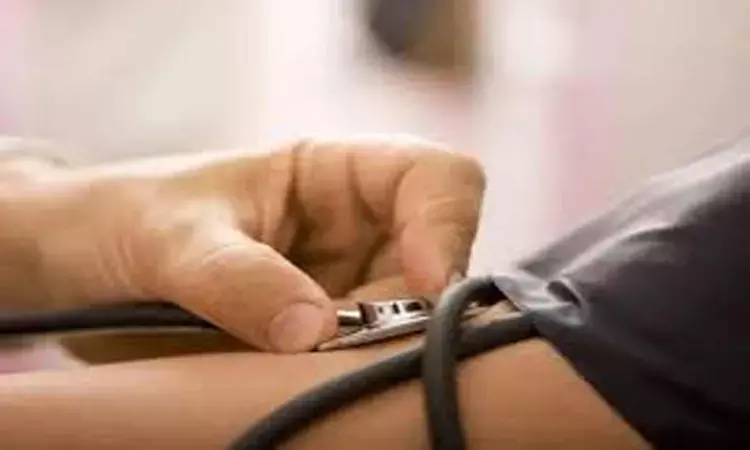- Home
- Medical news & Guidelines
- Anesthesiology
- Cardiology and CTVS
- Critical Care
- Dentistry
- Dermatology
- Diabetes and Endocrinology
- ENT
- Gastroenterology
- Medicine
- Nephrology
- Neurology
- Obstretics-Gynaecology
- Oncology
- Ophthalmology
- Orthopaedics
- Pediatrics-Neonatology
- Psychiatry
- Pulmonology
- Radiology
- Surgery
- Urology
- Laboratory Medicine
- Diet
- Nursing
- Paramedical
- Physiotherapy
- Health news
- Fact Check
- Bone Health Fact Check
- Brain Health Fact Check
- Cancer Related Fact Check
- Child Care Fact Check
- Dental and oral health fact check
- Diabetes and metabolic health fact check
- Diet and Nutrition Fact Check
- Eye and ENT Care Fact Check
- Fitness fact check
- Gut health fact check
- Heart health fact check
- Kidney health fact check
- Medical education fact check
- Men's health fact check
- Respiratory fact check
- Skin and hair care fact check
- Vaccine and Immunization fact check
- Women's health fact check
- AYUSH
- State News
- Andaman and Nicobar Islands
- Andhra Pradesh
- Arunachal Pradesh
- Assam
- Bihar
- Chandigarh
- Chattisgarh
- Dadra and Nagar Haveli
- Daman and Diu
- Delhi
- Goa
- Gujarat
- Haryana
- Himachal Pradesh
- Jammu & Kashmir
- Jharkhand
- Karnataka
- Kerala
- Ladakh
- Lakshadweep
- Madhya Pradesh
- Maharashtra
- Manipur
- Meghalaya
- Mizoram
- Nagaland
- Odisha
- Puducherry
- Punjab
- Rajasthan
- Sikkim
- Tamil Nadu
- Telangana
- Tripura
- Uttar Pradesh
- Uttrakhand
- West Bengal
- Medical Education
- Industry
Home BP monitoring best for diagnosing hypertension and estimating CVD risk: Study

USA: Monitoring home BP (HBP) for 1 week is the best approach for diagnosing hypertension compared with office blood pressure (OBP), ambulatory BP (ABP), suggests a recent study in the Journal of the American College of Cardiology.
The results are in contrast to the currently followed guidelines that recommend ambulatory BP (ABP) over HBP for hypertension diagnosis. The JACC study questions home BP monitoring's role as second fiddle.
The accurate measurement of blood pressure (BP) is very important for the diagnosis and management of hypertension and its associated cardiovascular disease (CVD) risk. Although BP measurement in an office setting has been the cornerstone of clinical management. However, several meta analyses and systematic reviews have shown that out-of-office BP measured either with home BP monitoring (HBPM) or ambulatory BP monitoring (ABPM), has a stronger association with CVD risk and target organ damage.
Determining the reliability and predictive validity of OBP, ABP, and HBP can inform which is best for diagnosing hypertension and estimating CVD risk. Considering this, Joseph E. Schwartz, Columbia University, Irving Medical Center, New York, New York, USA, and colleagues aimed to assess the reliability of OBP, HBP, and ABP and evaluate their associations with left ventricular mass index (LVMI) in untreated persons.
For the purpose, they performed The Improving the Detection of Hypertension (IDH) study -- a community-based observational study. The study enrolled 408 participants who had OBP assessed at 3 visits, and completed 3 weeks of HBP, 2 24-h ABP recordings, and a 2-dimensional echocardiogram.
Key findings of the study include:
- The reliability of 1 week of HBP, 3 office visits with mercury sphygmomanometry, and 24-h ABP were 0.938, 0.894, and 0.846 for systolic and 0.918, 0.847, and 0.843 for diastolic BP, respectively.
- The correlations among OBP, HBP, and ABP, corrected for regression dilution bias, were 0.74 to 0.89.
- After multivariable adjustment including OBP and 24-h ABP, 10 mm Hg higher systolic and diastolic HBP were associated with 5.07 and 3.92 g/m2 higher LVMI, respectively.
- After adjustment for HBP, neither systolic or diastolic OBP nor ABP was associated with LVMI.
"Our analyses demonstrate that office BP, HBPM, and ABPM do not measure the same underlying parameter and that 1 week of HBPM has a stronger association with LVMI than awake, asleep, or 24-h ABPM or 9 office BP readings taken over 3 visits. Also, 1 week of HBPM provided more reliable estimates of both SBP and DBP than either office BP or 24-h ABPM," wrote the authors.
"These data support the use of HBPM over ABPM and office BP for the diagnosis of hypertension and its associated risk of CVD," they concluded.
The study, "Reliability of Office, Home, and Ambulatory Blood Pressure Measurements and Correlation With Left Ventricular Mass," is published in the Journal of the American College of Cardiology.
DOI: https://www.jacc.org/doi/10.1016/j.jacc.2020.10.039
Dr Kamal Kant Kohli-MBBS, DTCD- a chest specialist with more than 30 years of practice and a flair for writing clinical articles, Dr Kamal Kant Kohli joined Medical Dialogues as a Chief Editor of Medical News. Besides writing articles, as an editor, he proofreads and verifies all the medical content published on Medical Dialogues including those coming from journals, studies,medical conferences,guidelines etc. Email: drkohli@medicaldialogues.in. Contact no. 011-43720751


